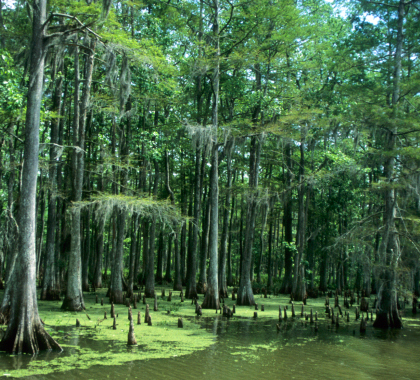A circuit court judge in Florida struck down a so-called “rights of nature” amendment to the Orange County Charter.
Amendment 1, passed in 2020 with the support of 89 percent of voters, declared waterways in Orange County have the right to “exist, flow, to be protected against pollution and to maintain a healthy ecosystem.”
A lawsuit filed on behalf of the Boggy Branch, Crosby Island Marsh, Lake Hart, Lake Mary Jane, the Wilde Cypress Branch, and every other body of water in southern Orange County, sought to block a permit issued by the Florida Department of Environmental Protection to the developer Beachline South Residential. The permit granted the developer permission to dredge waterways as part of a residential and commercial building project.
A human co-plaintiff, Chuck O’Neal, argued these activities would violate the rights of the bodies of water. O’Neal was chairman of the Right to Clean Water Political Committee, an activist group that campaigned for passage of the charter amendment.
The Orange County charter codifies local ordinances in the Sunshine State’s fifth-most populous county and home to Orlando. The court ruled the amendment was preempted by state law.
Law Limits Local Protections
The charter amendment was opposed by the Florida Chamber of Commerce, which fought for the passage of the SB 712, the “Clean Waterways Act,” (CWA) adopted by the Florida Legislature and signed by Gov. Ron DeSantis in 2020.
“[T]he “rights of nature” [movement is a] “fringe legal philosophy with dramatic implications for property rights, regulatory certainty, local government permitting power, and smart growth,” said the Chamber in a press release. “Although adoptions [sic] of this legal philosophy would result in a complete reconstruction of environmental law and judicial standing, not to mention an avalanche of litigation, proposals like this sound superficially attractive to voters, only highlighting the need to nip this fringe movement in the bud.”
Judge Paetra Brownlee of Florida’s Ninth Circuit Court agreed. She ruled against O’Neal and the water bodies, finding the charter amendment was preempted by Florida’s CWA.
The CWA bans “local governments from recognizing or granting certain legal rights to the natural environment or granting such rights relating to the natural environment to a person or political subdivision.”
Controlling Other People’s Property
Rights of nature laws are not about protecting the environment, they are about some people controlling other people’s property without the inconvenience of having to pay for the privilege, says H. Sterling Burnett, Ph.D., director of the Arthur B. Robinson Center on Climate and Environmental Policy at The Heartland Institute.
“Right of nature amendments are not about protecting nature but rather about controlling development and neighbors using government to control other people’s uses of their private property, without paying them for it, or compensating them as the U.S. Constitution’s fifth amendment demands,” said Burnett. “Those pushing such charters, bills, and amendments never apply their provisions to themselves, tearing down their homes or businesses, which presumably harmed or altered the natural environment, to recompense nature for the rights they violated.”
The beneficiaries of such policies are the owners of existing developments, which increase in value if other people’s use of their own land is limited, says Burnett.
“It is only property owners who held off developing their property until now who are punished by these laws,” said Burnett. “Those who did develop want those who didn’t to provide a public service—an unchanged environment—for their enjoyment.”
Legislatures are defending the rights of property owners by passing state laws to preempt such local laws as the Orange County amendment, says Burnett.
“States, including Florida, recognized the growing collaboration of local special interests with radical environmentalists to prevent development, town by town, county by county, and rightly stepped in to protect private property rights, by barring such local development bans,” Burnett said.
O’Neal says he plans to appeal Brownlee’s decision.
Tim Benson (tbenson@heartland.org) is a senior policy analyst at The Heartland Institute.
For more on wetlands, click here.
For more on public policy in Florida, click here.
